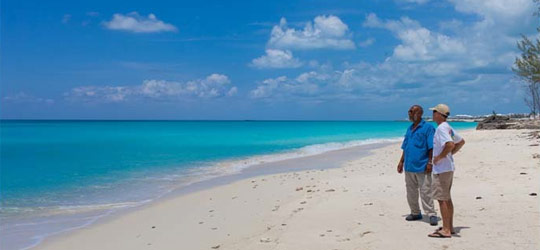
Sparked by the latest twist in the ongoing saga over a cruise ship terminal and offshore island planned for Bimini after news of construction permits appeared in the Miami Herald before local residents and environmentalists who had been begging for information had been informed, attorneys for two conservation groups said today they have been instructed to file legal action.
“The level of contempt being shown for local Bahamians continues to shock me,” said Fred Smith, QC. “It is unbelievable that the public in South Florida should be told about grant of a construction permit for the 1,000-foot pier and 4.5-acre island before it is made public in Bimini or the rest of The Bahamas.”
Smith, who serves as a director of the fast-growing environmental movement Save The Bays, pointed to numerous attempts to get information on plans for North Bimini and to obtain an Environmental Impact Assessment, including an effort by the usually conservative Bahamas National Trust which expressed “grave concern” about the environmental costs of the planned development.
Bimini with a population of about 1,600 became the focal point of the swirling debate about anchor projects and large developments on small islands when the Malaysian-based Genting Group purchased land from Bimini Bay developers to build a resort complex that would eventually include two hotels, a casino and cruise ship terminal, a plan that would alter the quiet, laid-back lifestyle associated with the island in the northern Bahamas just 60 miles from South Florida.
The casino opened in May with a super fast ferry zipping passengers from Miami to its tables and sports book and returning the same day for less than $100. Several taxi drivers and boat captains said the ferry and the concentration of visitors at the casino instead of being widely distributed throughout North and South Bimini has caused them to lose business. But the government has continually said the new development will create jobs during economically challenging times and most recently announced a planned 300 jobs.
A number of local residents who belong to Bimini Blue Coalition, another non-profit organisation, have begged for information and urged publication of an environmental impact assessment, saying the public must be given an opportunity to comment prior to approval. But many in Bimini have said that the promise of future jobs is not compensating for the fares and business they are losing or the lack of visitors flying in who might rent a car or eat a meal in a local place outside the casino area or what could happen to fragile coral reefs in the path of the pier and cruise ship traffic.
Now, Mr. Smith said, he and another lawyer who specializes in environmental law have been instructed on both organisations’ behalf to file a judicial review and seek an injunction, halting activity at the controversial site until the court can review the process and procedures that led to alleged approvals or to the start of construction without permits, an act that was voluntarily halted by the developer after attention was brought to it.
“I can confirm that Save The Bays as well as Bimini Blue Coalition are instructing attorneys to mount a judicial review action to quash any permits that may have been obtained without due process and also to require the relevant authorities to take action under the various laws to sanction any activities that may not have been properly permitted,” said Mr. Smith.
He compared what is happening in Bimini with large scale developments in Guana Cay, Abaco and Port Lucaya, Grand Bahama where “man-made fairy tale” cruise ports were unsustainable and the islands were left with what he called white elephants. “We are also making enquiries as to whether or not the provisions of the Planning and Subdivison Act have been complied with, “ said Mr. Smith
“The model of overnight creation, instant landscaping, instant development doesn’t work in the Family Islands,” he said. “Creating overnight development sensations is a misconceived, misconstrued, misinformed and socially, culturally and environmentally catastrophic policy which does not work for the Family Islands that need small environmentally sustainable communities and projects that are organic and proportionate.”
According to spokesmen for both groups, passage of a Freedom of Information Act that would force information to be made public before decisions are made and an Environmental Protection Act would ensure that local residents would have a say in plans affecting their communities before approvals or permits are given and would guarantee better environmental preservation.
Save The Bays said its online petition urging passage of both pieces of legislation at www.savethebays.bs is gaining signatures daily.


